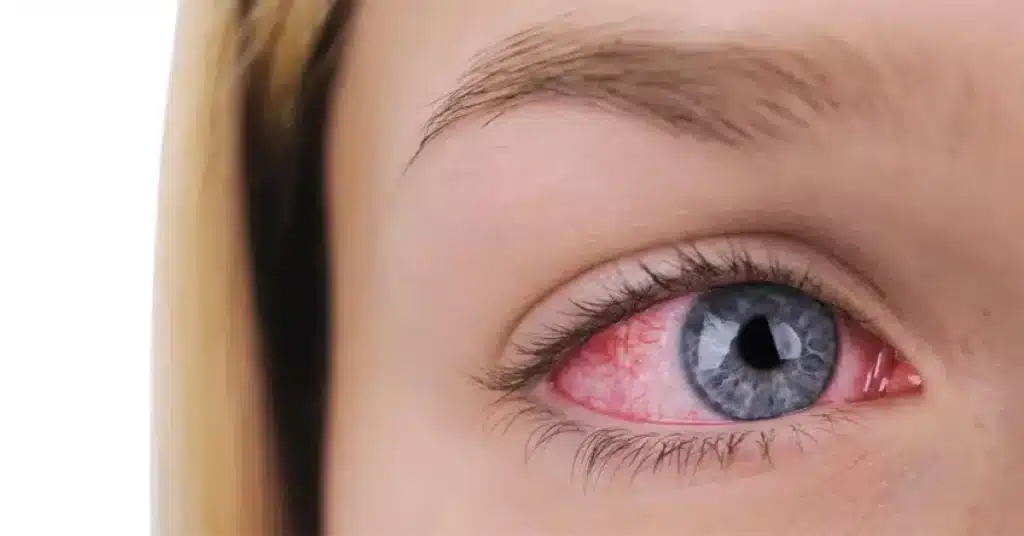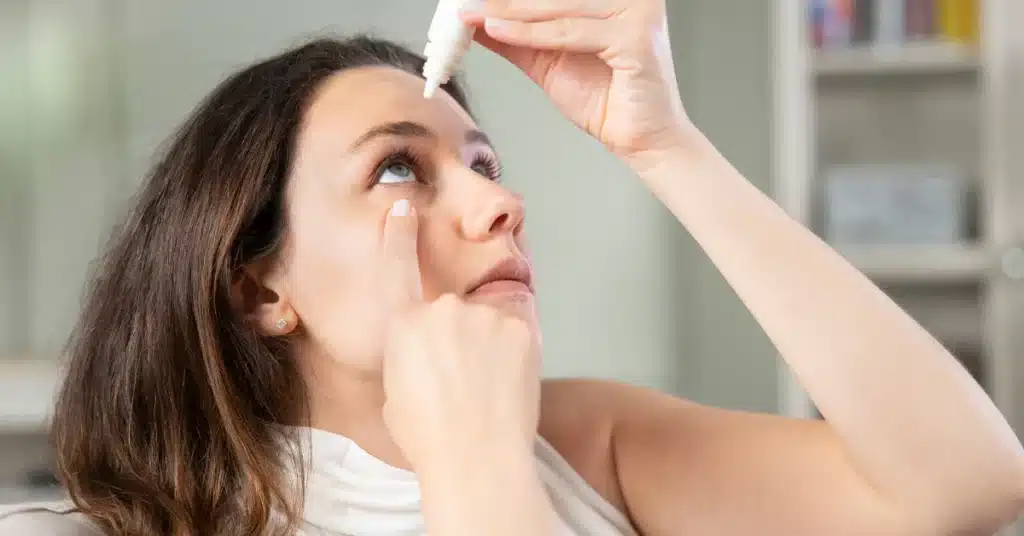Eye allergy, or Allergic Conjunctivitis, occurs when your eyes react to allergens such as dust mites and mold.
Such allergies can lead to inflammation of the eyes, causing discomfort and irritation.
The condition causes various symptoms, including itching, redness, tearing, and swelling.
This article will focus on eye allergies, its symptoms, types, causes, and treatments available.
Understanding eye allergies
Eye allergies occur when the eyes react to allergens like pollen and mold, causing itching and redness.
The immune system releases histamine as a defense mechanism in response to such allergens.
Eye allergies can lead to various symptoms, such as red eyes, excessive tearing, and swelling.
Consulting an eye specialist ensures proper diagnosis and tailored treatment for overall eye health.
Discover relief for itchy allergic eyes! Read “Eye Drops for Allergies” to discover the best eye drops for allergy and relief comfort!
Eye allergy symptoms
The severity and length of eye allergy symptoms might vary based on the allergen.
Recognizing eye allergy symptoms is essential for treatment and effective management.
Some of the common symptoms of eye allergies are:
Redness: The pink or bloodshot appearance of the eyes is the primary symptom of eye allergies.
Swelling: Allergic reactions can result in swollen eyes, particularly around the eyelids.
Burning sensation: Many individuals who have eye allergies experience a burning or stinging sensation.
Itching: Persistent itching, particularly around the eyes, is a typical symptom of eye allergies.
Tearing: Excessive tearing and watery eyes are common signs of allergies.
Types of eye allergies
 Source: Pixelshot
Source: PixelshotIt is essential to understand the various types of eye allergies to choose the best treatment option for your problem.
Different types of allergens can cause different types of eye allergies.
Understanding these types is important for determining the best treatment.
This section will discuss the various types of eye allergies in detail:
Eye makeup allergies
Individuals may develop eye allergies due to cosmetics, particularly eye makeup.
This allergy can result in red eyes and itchy and swollen eyes.
If you feel that your eye makeup is the reason for eye allergies, consider switching to hypoallergenic products.
Awareness of expiration dates and ingredients used in making products is essential to prevent potential allergic reactions.
Under eye allergies
Under-eye or periorbital allergies are typically caused by allergens in cosmetics, lotions, or skincare products.
As the skin surrounding the eyes is fragile and prone to irritation, it can lead to allergic reactions.
Redness, itching, and puffy eyes are common signs of under-eye allergies.
Eye twitching allergies
Some allergies can cause your eyes to twitch, thus phenomenon is also known as Myokymia.
Such reactions may lead to muscular spasms around the eye, causing it to twitch.
These involuntary contractions might be bothersome but can be relieved by treating the underlying allergy.
Eye allergy in one eye
Eye allergies usually affect both eyes at the same time. However, some allergies might affect only one eye in certain situations.
This can be confusing because it may resemble some other underlying medical conditions such as Dry Eyes.
Eye allergy in one eye can be caused by localized allergen exposure or an underlying issue.
If you just have symptoms in one eye, consult an eye specialist to avoid potential risks.
Eye discharge allergies
Allergies to the eyes can cause excessive tear production and discharge.
Itching and redness may occur along with the discharge, which may be clear or slightly cloudy.
If you have eye discharge due to allergies, treating the underlying allergic reaction is critical.
Eye allergy treatments
 Source: Porntep-Kawjun
Source: Porntep-KawjunSeveral treatment options are available to relieve eye allergies and improve eye health.
Over-the-counter eye drops, avoiding allergen exposure, and immunotherapy are some treatments for eye allergies.
This section will discuss eye allergy treatments in detail:
Over-the-counter eye drops
Over-the-counter eye drops work by reducing the histamine response caused by allergens.
Individuals use over-the-counter eye drops as they provide relief from redness and itching.
OTCs are available without a prescription and provide immediate relief.
It is essential to get medical attention if your symptoms persist or worsen.
Avoid allergen exposure
Pollen, pet dander, dust mites, and mold are some common allergens that can induce allergic reactions.
Identify and avoid the allergen that is causing your symptoms. To reduce your allergen exposure, take the following steps:
During pollen seasons, keep windows closed.
- Use high-efficiency particulate air (HEPA) filters in your home and clean and vacuum it regularly
- Wash bedding, curtains, and carpets regularly
- On high-pollen days, limit your outdoor activity
Cold compress
Applying a cold compress to closed eyes helps reduce puffiness, irritation, and burning.
Cold compresses restrict blood flow to the eye region, reducing redness and relieving eye strain.
Immunotherapy
Allergy injections or sublingual tablets can help the immune system desensitize certain allergens, providing long-term relief.
Immunotherapy, done under doctor’s supervision, introduces tiny amounts of allergens to your body slowly.
As your body gets used to them, it becomes less sensitive, making allergy symptoms less severe.
This treatment works well for individuals with persistent and severe eye allergy problems.
Prescription medications
Your doctor may prescribe medicines when over-the-counter eye drops are ineffective.
Antihistamine eye drops such as Levocabastine (Livostin) can temporarily relieve allergic reactions.
Corticosteroid eye drops, such as Lotemax and Alrex, are prescribed to reduce inflammation in severe cases.
However, they should only be used under professional supervision because long-term use can have potential side effects.
To learn more about available treatments for eye allergy, Read “Eye Allergy Treatment”
Summing up
Eye allergies are common, but they are easily managed with proper treatment and management.
Redness, swelling, and burning sensation are some eye allergy symptoms.
Identifying the type of eye allergy, including those triggered by eye allergies, eye twitching, and eye discharge, is crucial for effective management.
Several alternatives are available for eye allergies, from limiting allergen exposure to over-the-counter eye drops.
In some individuals, immunotherapy and cold compresses may also help relieve symptoms.
Severe cases need professional attention, possibly requiring prescription antihistamine or corticosteroid eye drops.
It is essential to seek medical assistance if eye allergy symptoms persist or worsen.
Frequently Asked Questions
Can allergies cause eye pain?
Yes, allergens can cause eye pain, particularly when they induce irritation, inflammation, or itching.
Prolonged rubbing or scratching of the eyes due to allergies can also cause pain.
To avoid discomfort, it is critical to treat symptoms of allergies.
How do you get rid of eye allergies?
Identify and avoid triggers, use antihistamine eye drops for relief, maintain good eye hygiene, and consider natural remedies to eliminate eye allergies.
Seeking professional advice ensures an accurate diagnosis and tailored treatment for lasting relief.
Can eye allergy go away on its own?
Mild eye allergies may resolve on their own when allergen exposure is minimized.
However, persistent or severe symptoms often require targeted treatments.
Seeking professional guidance ensures an accurate diagnosis and appropriate management for lasting relief.
What do eye allergies look like?
Eye allergies include symptoms such as redness, itching, tearing, and swelling.
The eyes may appear bloodshot, and individuals might experience discomfort.
Seeking professional advice helps identify the specific symptoms and determine appropriate management strategies.
Can allergies cause Dry Eyes?
Yes, allergies may worsen Dry Eye symptoms. Allergic responses, especially those that impact the eyes, can cause inflammation and irritation, resulting in dry and itchy eyes.
When referencing outside resources, GoodrxMedicine always provides full citations. To learn more about the measures we use to maintain the quality of our content, please review our Content Information Policy.











